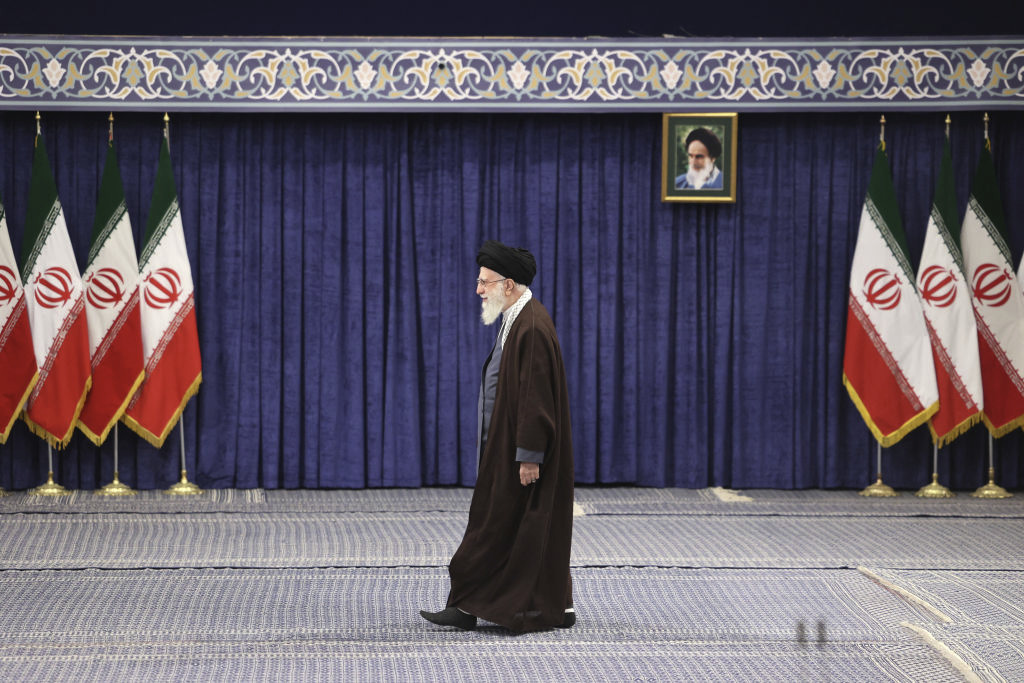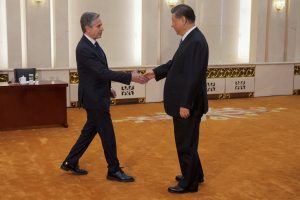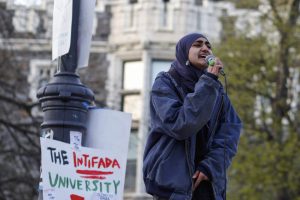Iran and Israel: Is the Denial Game Over?

If “Supreme Guide” Ayatollah Ali Khamenei does nothing in response to the recent Israeli airstrike in Syria, he could anger his core supporters. If he orders attacks on Israeli and/or Jewish targets, he won’t be able to cite plausible deniability. And that, as the Iranian state TV analyst suggests, could give Israel an excuse for attacks on big targets in Tehran itself. Pictured: Khamenei leaves a polling station in Tehran on March 1, 2024.
Soleimani would do everything to avoid a direct clash with either Israel or the US forces in the region.
If he [“Supreme Guide” Ayatollah Ali Khamenei] does nothing, he could anger his core supporters. If he orders attacks on Israeli and/or Jewish targets, he won’t be able to cite plausible deniability. And that, as the Iranian state TV analyst suggests, could give Israel an excuse for attacks on big targets in Tehran itself.
“Will this time be different?” This is the question that haunts Tehran political circles as more body bags are flown in from Damascus.
The body bags contain the mortal remains of 13 Iranian diplomatic and military officers, including two senior commanders of the Islamic Revolutionary Guard Corps (IRGC), General Muhammad-Reza Zahedi (alias Abu Mahdi) and Gen. Muhammad-Hadi Haj-Rahimi, killed in an Israeli airstrike on what was presented as an Iranian consular building in the Syrian capital.
To be sure, this is not the first time that Israelis have taken out IRGC officers, and Lebanese, Iraqi, Syrian, Pakistani, and Afghan mercenaries in Syria.
The take-out operation started in 2015 and reached a peak in 2020. The last time an Iranian official organ provided figures was in 2018, when the Foundation for Martyrs and Self-Sacrificers put Iran’s losses at around 5,000. The figures didn’t show how many were Iranian officers or foreign mercenaries.
In the first three years of this deadly cycle, Tehran used the transfer of body bags from Damascus as a propaganda ploy and organized mass rallies on the burial day of its “heroes of Islam.” Later, when Tehran’s losses grew the propaganda aspect was forgotten, the “heroes of Islam” were quietly buried in their native hometowns and villages.
Over time, partly thanks to the influence of late Gen. Qassem Soleimani, Tehran decided to swallow the bitter pill and brag about “taking revenge,” but not retaliate.
Soleimani would do everything to avoid a direct clash with either Israel or the US forces in the region. In fact, he may have established a channel of communication with the Israelis through his correspondence with Gen. David Petraeus, then the top US military commander in the region.
In line with that tacit agreement, Israel never officially admitted its more than 40 attacks spread over six years.
Tehran reciprocated by not directly blaming Israel, using the euphemism “enemies of Islamic Revolution” instead.
Even when Israelis killed Gen. Hussein Hamadani, one of “Supreme Guide” Ayatollah Ali Khamenei’s favorite commanders, Tehran decided not to implement its threat of “taking hard revenge.” Similarly, the assassination of six top IRGC scientists in Iran itself went unpunished.
Soleimani’s strategy was to fight Israel and the US through proxies, while dangling the promise of reining them in as a card in his deadly poker game with the “Great Satan” and the “Zionist entity.”
Has that fragile balance of terror come to its end? Vibes from Tehran suggest that it has.
One reason is that there is no personality with Soleimani’s charisma and access to huge financial resources to continue marketing his idea of “kill the enemy with a thousand cuts” and the use of mercenaries as human shields.
Another reason is that this time around, Israel has bombastically admitted having carried out a punitive attack against the Islamic Republic.
More importantly, perhaps, this is the first time that Israel has attacked a building flying the official flag of the Islamic Republic of Iran. All previous attacks were on bases and buildings where Iranian officers and mercenaries were located as “advisers” to the official Syrian army.
Tehran could pretend that those attacks were against the Syrian Arab Republic, which had the responsibility to respond.
This time, the attack was against the Iranian consulate and the adjacent residence of the ambassador, both flying the Islamic Republic’s flag. In international law and diplomatic norms, an attack on an embassy or consulate is a casus belli (a cause for war).
Another factor that might force Khamenei to respond differently this time is genuine anger among his followers, already uneasy about his refusal to active support Hamas in the Gaza war.
“How much longer should we wait for the promised hard revenge to happen?” demands Ibrahim Azizi, vice-chair of the National Security Committee in the Majlis (Islamic Consultative Assembly).
Announcing the dispatch of a special mission to Damascus to “see what happened,” Majlis spokesman Nizameddin Mussawi says “taking revenge is a national demand that cannot be ignored.”
The official news agency IRNA echoed that sentiment with the headline, “The Whole Nation Demands Revenge”. In an editorial on Tuesday, IRNA suggested that “embassies and consulates of the Zionist enemy in several countries are ready targets for revenge.” Ominously, it added: “the balance of terror must be restored”.
Iranian official TV’s chief strategic analyst Mahdi Kharratian surprised viewers by saying, “If we do nothing this time, we ought to be prepared for the assassination of the highest officials in Tehran.”
The “enough is enough” message is echoed in sermons by some of the most radical mullahs. Ayatollah Hashem Husseini says, “As the center of resistance, the Islamic Republic cannot show weakness especially now that Palestinian resistance is rubbing the Zionist nose in the dust.”
Ayatollah Pour-Khaqani says Israel attacked the Islamic diplomatic mission in Damascus to hide its humiliation by Palestinians.
IRNA echoes that theme by claiming that “Netanyahu has failed in his three objectives: Freeing Israeli captives, killing Yahya Sinwar and Muhammad Deif, and destroying the Gaza tunnels.”
Kamal Sajjadi, spokesman for the Followers of the Imam Movement, suggests that the forthcoming Quds (Jerusalem) Day could be a proper time for revenge.
Newly elected Majlis member Hojat al-Islam Ali-Reza Panahyan says the Islamic Republic must maintain its military presence in Syria, and this requires assuring the safety of “our Islamic heroes”.
The fact that Khamenei ordered a full session of the High Council of National Security, the first in more than two years, shows his concern about dissent in his core constituency and the perception that his “strategic patience” is a pretense for lack of resolve.
Seen from his angle, there is a growing danger that the radical elements in his camp will see him as an indecisive leader, and blame him for Israeli “audacity.”
Interior Minister Gen. Ahmad Wahidi says, “Israel should expect a suitable answer,” but adds that “the decision must come from the Leader of the Revolution,” i.e. Khamenei.
Iran’s President Ayatollah Ebrahim Raisi, too, has promised “crushing revenge” but insists that the decision must come from Khamenei.
The “Supreme Leader” is in a delicate situation.
Israel has broken the tacit agreement that allowed both sides to cite plausible deniability about attacks against each other. If he does nothing, he could anger his core supporters. If he orders attacks on Israeli and/or Jewish targets, he won’t be able to cite plausible deniability. And that, as the Iranian state TV analyst suggests, could give Israel an excuse for attacks on big targets in Tehran itself.
egretnewseditor@gmail.com

























